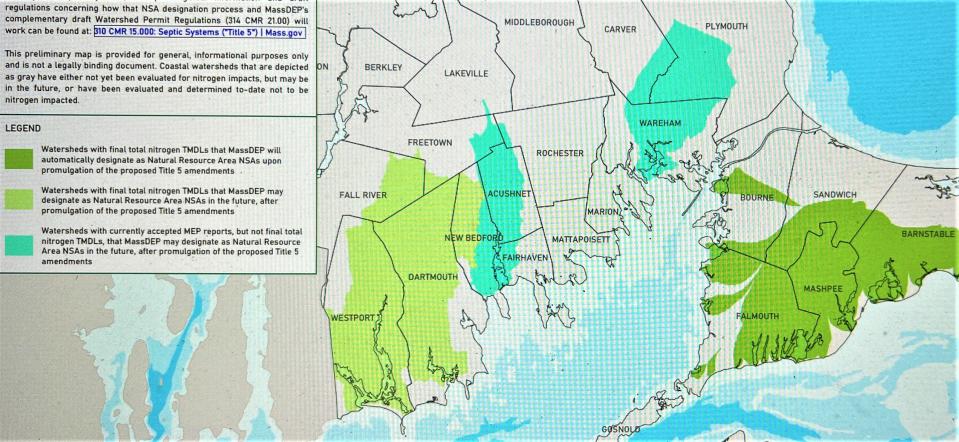Homeowners could face thousands in septic-system upgrade costs under state rule changes
NEW BEDFORD — Area residents could face mandatory septic upgrades costing thousands of dollars under proposed Title 5 regulations on track to go into effect in early 2023.
It's either that or their community has to agree to a comprehensive 20-year-plan to reduce nitrogen pollution, which would spare homeowners the individual expense, according to the state Dept. of Environmental Protection.
A local public health official says the proposed amendments are "out of touch with reality" when it comes to implementation, rendering them "arbitrary and capricious," as well as expensive.
Cape Cod septic-system owners are first in line to face thousands of dollars in mandated septic upgrades when the proposed Title 5 amendments go into effect, scheduled in early 2023, setting off a five-year deadline to upgrade.
The amendments will immediately designate 30 Cape Cod watersheds as natural resource "Nitrogen Sensitive Areas," requiring septic system owners within the designated areas to "upgrade their systems with the best available nitrogen reducing technology within five years of designation."
Communities can apply for 'watershed permit'
Or, the community can for apply for the 20-year "watershed permit," designed to reduce nitrogen pollution by up to 75%. A community can set that process in motion and spare homeowners the 5-year update deadline by filing a notice of intent to pursue the watershed permit within 18 months of the amendments taking effect. Or, the community can simply apply for the permit.
Many South Coast residents are next in line to face either the mandatory upgrade in five years or community participation in the watershed permit process. That's once areas within their communities are designated natural resource Nitrogen Sensitive Areas at an unspecified time in the future.
While the Cape communities would immediately be affected with the amendments' passage, the timeline on the next tier of affected communities — including large portions of Westport, Dartmouth, New Bedford, part of Freetown, and a portion of Fall River — has not been specified by DEP.

SouthCoast towns face NSA designation
And next in line behind those communities as potential NSA designees, again without specified timelines, are areas including another wide swath of New Bedford, much of Acushnet, a portion of Fairhaven, as well as much of Wareham and portions of Carver and Plymouth. According to the DEP, these second and third wave communities may be designated as containing NSAs "in the future," after the amendments' enactment.
These future NSA designations will be made following a public process, according to the DEP.
Regulations target pollution
The amended regulations are intended to address the "devastating" effect nitrogen pollution has caused to embayments and estuaries, said Marybeth Chubb, DEP wastewater management program section chief, during informational presentations on the amendments.
Sites are designated nitrogen sensitive areas because they've logged "excessive amounts of nitrogen" in the water, according to the DEP, to the point they don't meet Mass. water quality standards. This leads to an "impaired" listing and development of a "total maximum daily load," which is approved by the federal EPA, and establishes a target amount of a pollutant that a waterbody can accept and still maintain its designated use.
The DEP states 85% of the Cape's wastewater disposal is through septic systems, while in Buzzards Bay the single largest source of nitrogen is septic systems.
The nitrogen pollution uses up oxygen and causes eutrophication, which accelerates algae and invasive plant growth, killing off native desirable plants and aquatic life, and can also turn the water murky and malodorous.Eutrophication has a negative economic impact, as well, hurting fishing, shellfishing, recreation, tourism, real estate and business, according to the DEP. Unaddressed, this will only get worse, it states.
While there are two avenues to reduce pollution described in the amendments, the DEP appears to favor the community approach over the homeowner approach.
What is the watershed permit?
The watershed permit "is a new, innovative approach to provide communities the opportunity to develop and implement solutions for addressing water quality challenges. The permit would enable the community to employ a greater range of solutions to address its water quality needs, including alternative or innovative approaches to reduce the amount of nitrogen and other nutrients that are discharged in the watershed," according to the DEP.
The DEP's Tim Jones stated during an online informational session that the individual septic approach might be insufficient and require further action. Watershed permit communities, on the other hand, can use various methods to efficiently estimate and reduce nitrogen pollution.
There have also been concerns with costs, as well as availability of supplies and contractors with the septic-system approach. And municipalities would have to approve all upgrades, and provide enforcement, with DEP assistance if needed, he stated.
The community approach, on the other hand, could provide broader improvement given more time, more flexibility, wider distribution of costs, and the use of unconventional and adaptive methods. Though, Jones added, it may also lead to community-wide tax/rate increases.
Conservation Law Foundation lawsuit
The DEP is currently taking public comment on the proposed changes, and held three public hearings within about a week of each other, with the last on Dec. 5 in Barnstable. It will continue taking written comment until Dec. 16 before "promulgating" the changes.
Christopher Michaud, Dartmouth Director of Public Health, is currently at work penning his objections to the proposal as part of the public comment process. Though, he added, he's had difficulty obtaining some records from the DEP, saying the agency "has been completely obstinate in providing" them.

Michaud said the DEP is being motivated in large part by lawsuits filed by the Conservation Law Foundation to reduce nitrogen pollution on Cape Cod. The CLF has reportedly agreed to stay a lawsuit against the state pending the amendments' enactment.
DEP Commissioner Martin Suuberg stated nitrogen pollution needed to be addressed in a timely fashion in announcing the amendments in June, Michaud said.
Michaud added, "Why all of a sudden are we addressing nitrogen in a timely manner when we've known about nitrogen as a source of pollution for decades?"
Costs will come back to taxpayers
He said the goal of restoring the environment is laudable, "but the regulatory regime that they're proposing this under is extraordinarily problematic - because one way or another this all comes back to the taxpayer."
Septic-system upgrade or replacement costs have been estimated to be from $30,000 to $35,000, but Michaud said the tab is difficult to calculate with any certainty. It can be argued the technology doesn't actually exist to do what's being proposed.
"We have no idea what this is going to cost. But we do know for some people it's going to cost a heckuva a lot of money," he said.
And that's just the upfront costs, he said. The updated systems are described by DEP as energy intensive, which will add to the electric bill, and they will require annual maintenance.
He added the community watershed permit alternative was "disingenuous."
Michaud said, "They know full well that we don't control the whole of nitrogen. There are aspects that are uncontrollable but yet they identify them as controllable. The problem is that it was scientists who came up with these pie charts, stating what is controllable. Yes, in an ideal world. But we have things called laws and exemptions and statutes and agricultural protections, as well as zoning."
'No seat at the table'
Part of the problem with these amendments, he said, is that the affected municipalities had "no seat at the table," when they were drawn up.
"The only entity right now that we've been able to identify as being at the table of the Nitrogen Sensitive Area Subcommittee (formed in 2020) was a private activist group from Buzzards Bay (Buzzards Bay Coalition), not a municipality."
Michaud added if the amendments are enacted "there is no holding DEP back. There's no transition timeframe in these regulations that say, well, DEP is going to do it in five years or six years or 10 years." They can move forward immediately, he said.
Michaud said, "When you wrap this all up, they're passing a regulation that has two components to it. One, everybody puts this system in that doesn't exist. And, when it does exist, if it ever exists, will not be available in enough quantity."
He said the court system wouldn't be able to handle enforcement with the thousands of homes that could potentially run afoul of the new regulations. "DEP doesn't have the lawyers. Towns don't have the funding."Or, there's the watershed permit approach, which Michaud says carries "no guarantee that it will work, either."Michaud added, "If you pass a regulation that cannot be implemented because it' so out of touch with the reality of implementation, the regulation is arbitrary and capricious."
State Rep. Chris Markey, whose Ninth District includes Dartmouth, and New Bedford's Ward 3, Precincts D, E, F, said there was some skepticism that the private septic systems were causing the degree of nitrogen pollution being decried.
Agricultural aspect in Dartmouth and Westport
He said the agricultural component - Dartmouth and Westport are both by-right farming communities - might not be getting weighted adequately. And agriculture is regulated by the Mass. Dept. of Agricultural Resources, not DEP. Mandated commercial composting is also a factor with businesses producing 1,000 pounds a week or more of food wastes - wastes that can no longer be landfilled.
"There is a conflict, I suggest, that is between the ag world and DEP's regulatory charge," Markey said."What we need to do is try to find ways that we look at the science behind this and determine whether septic tanks in residential areas are really the cause of a significant amount of this," he said.
It would be easier to enforce, as well, if the numbers were pared down to larger pollution sources than "the massive amounts of people with septics in places like Mattapoisett, Marion, Dartmouth, and Westport."
Markey added, "We've got to follow the science and I just don't know if this is really following the science."
Written comments will be accepted by the DEP until 5 p.m. on Dec. 16, 2022. All comments submitted must include the name and contact information of the person providing the comments. Submit comment by e-mail to dep.talks@mass.gov and include "Title 5 & Watershed Permit" in the subject line. Written comments may also be submitted by mail and should be sent to MassDEP, Bureau of Water Resources – Division of Watershed Management, One Winter Street, 5th floor, Boston, MA 02108, Attention: Title 5 & Watershed Permit.
This article originally appeared on Standard-Times: Septic rule changes could cost residents thousands of dollars

